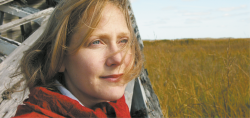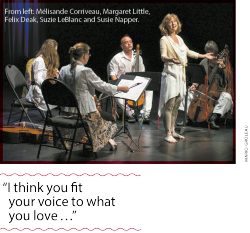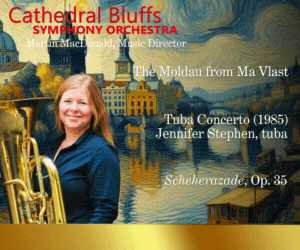You can view a video of this entire conversation, or listen to a podcast of it by clicking here.
 I got a sense of how far ahead Suzie LeBlanc dreams and plans very early in my conversation with her the morning of October 22, 2013. We were sitting in a book-lined seminar room at Massey College in the University of Toronto, talking about the reason for her 24-hour in-and-out flying visit — an event at Massey College that same evening to celebrate the launch of I Am in Need of Music, songs on poems by Elizabeth Bishop, a CentreDiscs CD that not only showcases LeBlanc’s soaring soprano but also testifies to her tenacity and vision as a questing collaborative artist with considerable staying power.
I got a sense of how far ahead Suzie LeBlanc dreams and plans very early in my conversation with her the morning of October 22, 2013. We were sitting in a book-lined seminar room at Massey College in the University of Toronto, talking about the reason for her 24-hour in-and-out flying visit — an event at Massey College that same evening to celebrate the launch of I Am in Need of Music, songs on poems by Elizabeth Bishop, a CentreDiscs CD that not only showcases LeBlanc’s soaring soprano but also testifies to her tenacity and vision as a questing collaborative artist with considerable staying power.
The poet Elizabeth Bishop of the CD’s title was born in Dorchester, Massachusetts in 1911; so 2011, her centenary, was the raison d’être for this particular project. But as LeBlanc explains, “It started even sooner than that with me finding out about Elizabeth Bishop in 2007 ... In 2007 I found this leaflet [about Bishop] in Great Village, and soon after I met Sandra Barry, an independent scholar who knows everything there is to know about Bishop ... She’d had a dream. Elizabeth Bishop was born in Massachusetts so she was American by birth. She spent a lot of time in Great Village, Nova Scotia as a child, and three of her grandparents were Canadian — were actually Maritimers — and she always wanted to be Canadian. She wrote, ‘I’m three quarters Canadian and one quarter New Englander.’ And she stuck to that story. She was very attached to this land, which was like her motherland.”
Here’s the thing: at the time she found the Bishop leaflet in 2007, LeBlanc was already looking for a “special project to celebrate my [2011] 50th birthday, and I didn’t know what it was going to be, but I was on the lookout for something and finally I came across this leaflet about Bishop, and got interested and went and researched and found a poem. Just one thing led to another and I suddenly thought, ‘I love this poet’s words, I love her vision, I love her voice.’ These would be words I would love to sing.”
 Bishop’s ability to re-vision the ordinary, like a kind of latter-day Robert Frost, has grabbed many a reader’s imagination, myself included, from the first poem of hers they’ve read. (In my own case it was a poem called “The Fish” which hit me between the eyes while working as a school textbook editor compiling literature anthologies on the west coast of Newfoundland in the late ’70s.) In LeBlanc’s case that first poem was one called “The Map.” “There’s one line in there. It says ‘Or does the land lean in to support the water from underneath’ or something like that, talking about the shoreline — ‘to lift the water from underneath,’ that’s it. And I’ve watched shorelines my whole life, and never had I thought to look at it as the land lifting the water from underneath, and I just thought what a wonderful vision ... to look at the world through inverted eyes.”
Bishop’s ability to re-vision the ordinary, like a kind of latter-day Robert Frost, has grabbed many a reader’s imagination, myself included, from the first poem of hers they’ve read. (In my own case it was a poem called “The Fish” which hit me between the eyes while working as a school textbook editor compiling literature anthologies on the west coast of Newfoundland in the late ’70s.) In LeBlanc’s case that first poem was one called “The Map.” “There’s one line in there. It says ‘Or does the land lean in to support the water from underneath’ or something like that, talking about the shoreline — ‘to lift the water from underneath,’ that’s it. And I’ve watched shorelines my whole life, and never had I thought to look at it as the land lifting the water from underneath, and I just thought what a wonderful vision ... to look at the world through inverted eyes.”
Nova Scotian composer Alasdair MacLean was the first of the four featured on the CD whom LeBlanc approached. “He led me to Sandra Barry, because he was already a Bishop fan and so he knew about this woman. And so, when Sandra and I met, both our dreams kind of connected and we said, we could do something very special for the centenary.”
The scope of that centenary celebration was astonishing: “Not only did we do this recording but a literary symposium, a film competition, a literary competition, many, many concerts, visual arts exhibitions.” And at every turn the sense of fated connection with the project grew for LeBlanc. “One concert we did was baroque music, because Bishop loved baroque music. She played the clavichord and carried one all her life. Wherever she moved she lugged along this clavichord and she studied in England with Ralph Kirkpatrick. It’s an amazing connection.”
Listening to LeBlanc describe the project, it’s a bit like the way she sings: commitment, passion, interconnectedness, one thing always leading to another: how the involvement of the other three composers on the CD (John Plant, Emily Doolittle and Christos Hatzis) came about; her meeting up with filmmaker Linda Rae Dornan, who along with LeBlanc was celebrating a 50th birthday in 2011; how together they retraced the path of a memorable Newfoundland pilgrimage undertaken by Bishop and a companion in 1932, minutely documented in Bishop’s journals; the Newfoundland people who knew people who had known Bishop that they met along the way.
Dornan filmed the journey as she and LeBlanc walked. The resulting DVD Walking with EB makes a moving and fitting companion disc in this Centrediscs release.
As for the CD itself, it has 11 pieces: ten settings of Bishop poems, preceded fittingly by an instrumental suite by MacLean, inspired, he says, by one line in the first poem he turned to, after sitting down to work on the project. “It’s true,” says LeBlanc. “It’s one line of ‘Cape Breton,’ which is ‘This silken water is weaving and weaving.’”
For me, the piece on the CD that grabbed me by the heart was Emily Doolittle’s setting of the shortest poem of the ten — “A Short Slow Life.” “That is a lovely, lovely poem,” LeBlanc agrees and quotes the very lines I am thinking of: “We lived in a pocket of time ... until time’s rough hand reached in and tumbled us out.”
“So was this project a ‘pocket of time’ for you?” I ask, “at a moment where you maybe needed that for a lot of reasons?”
 “I realize that now,” she says. “In retrospect I realize how much I was looking for, maybe, I don’t know, a mentor, a role model, but Bishop definitely served as this kind of model at a time when I was wanting to change things artistically in my life, and even personally ... It’s amazing what [Doolittle] did with that poem. I mean, because it was a short poem I was kind of imagining a short little piece, and it’s not that at all. Somehow she rhythmically did very interesting things, and with repetition. There is melody as well, but it’s somehow a poem that is like nature or something, it’s just — a little leaf here, a little fluff of something there — and not unlike, actually Bishop was a painter as well, and not unlike the way she may have painted nature herself.”
“I realize that now,” she says. “In retrospect I realize how much I was looking for, maybe, I don’t know, a mentor, a role model, but Bishop definitely served as this kind of model at a time when I was wanting to change things artistically in my life, and even personally ... It’s amazing what [Doolittle] did with that poem. I mean, because it was a short poem I was kind of imagining a short little piece, and it’s not that at all. Somehow she rhythmically did very interesting things, and with repetition. There is melody as well, but it’s somehow a poem that is like nature or something, it’s just — a little leaf here, a little fluff of something there — and not unlike, actually Bishop was a painter as well, and not unlike the way she may have painted nature herself.”
Despite the range of activity of the Nova Scotia-based Elizabeth Bishop centenary project, were one to use the internet as a source of information about Bishop, one would find it hard to get the sense of the Nova Scotia “motherland” that LeBlanc ascribes to Bishop. Bishop has been vigorously reclaimed by the U.S. as their own, as a sense of her place in 20th century poetry grows. “And who can blame them?” LeBlanc says. “I mean it was in 2004 that I needed to reconnect with my motherland Acadia and did the first CD La Mer Jolie and then in 2008 did [Chants d’Acadie:] Tout Passe. I’m not saying I’m done with my motherland, I may be doing another one, actually we’re recording it in January 2014, but yes, it’s interesting that I’ve managed to connect Bishop to her motherland as well. Yes.”
And what of musical “motherlands” rather than geographic ones? Toronto audiences have two opportunities to hear LeBlanc on familiar ground, first with Tafelmusik from November 6 to 10, singing a program of Purcell and Carissimi “with Charles Daniels, tenor, who is lovely.” And then November 21 she is back in town for Women’s Musical Club of Toronto, with Montreal-based viol consort Les Voix Humaines (who have been some of her closest musical connections, since soon after she arrived in that city to study). “Absolutely, absolutely, a group I’ve worked with a lot,” she says. But the repertoire November 21 is not entirely what one might expect. “It’s varied, actually, it goes from about Purcell to Gershwin. Which is an interesting thing. And the Voix Humaines love to have music arranged for the four gambas; it’s a quartet of gambas [Susie Napper, Margaret Little, Felix Deak and Mélisande Corriveau]. And so, it’s fun — we are doing some French songs like Autumn Leaves — Les feuilles mortes — very eclectic and lovely. It’s called “Summertime,” because we’re also doing Summertime, of course — and spans all sorts of eras but throughout there’s the Vivaldi Four Seasons played by the gambas.”
I ask if baroque repertoire became her original “home turf” because it was the “right size” for her voice. “I think it was more that it was the music I was passionate about, and my voice happened to fit it very well” she replies. “But I think you fit your voice to what you love as well in a way. Because now things are changing, because my love has become lieder, a lot, and Richard Strauss is now something I’m really spending a lot of time [with], Schumann, Schubert — French mélodie, with Fauré, Reynaldo Hahn and Debussy. And it just happened, you know — I didn’t call on that, but the passion suddenly came for that music and the passion also for contemporary settings, contemporary music — and maybe the desire to work with [composers] who are alive, you know.”
LeBlanc is not the first early and baroque vocalist to find herself drawn to contemporary repertoire; after all, both call for interpretive cohones; an ability to infer intention on the part of composers whose work has either not been heard for centuries or not yet heard at all.
“That’s right,” she says. “And these composers were amazingly open to suggestions, and that was wonderful.”
Listening to I Am in Need of Music I had found myself struck by the extent to which each of the composers, while so different in approach and attack, had layered into the work all those lovely top Gs and As and Bs that LeBlanc sends soaring over the liquid gold of her lower register. “Is it something that you talked about ahead, or did they just listen and instinctively tune into that?” I asked.
“No — I mean John Plant and Alasdair and Christos I think knew my singing, knew my voice, and they went and listened to things, and we never talked about anything like that. Emily was the one I knew the least and interestingly enough, when the piece first came there were bits that were not quite fitting — so we talked about it, and we changed some notes.”
“Just a few?”
“Oh, yes, but they were necessary to change.”
With Bishop’s poetry fresh in mind, redolent as it is with images of soaring and birds, I find myself asking her if perhaps Messiaen’s music is part of the future picture somewhere too.
“Well, I have recorded Messiaen,” she says. “Yes, I recorded pieces that are not often done. Chantes de terre et du ciel, which is a cycle for piano and voice, a bit like Poèmes pour Mi but a much less well-known one. That came out on ATMA in 2009, and a lot of early songs, and a lovely piece La mort du nombre, which I did with Lawrence Williford, and it’s a beautiful tenor and soprano piece. So I love Messiaen as well, so there you go.”
Our time winds down — after all there is still tonight’s Massey College Bishop CD launch to prepare for: the seven years of this particular immersion are clearly drawing to a close. “So now that you’ve been tumbled out of this particular pocket of time, where do you find yourself?” I ask.
“It’s an amazing feeling, to finally tumble out of it. I’m actually working on a new project — well, a few of them actually. I’m working on a project which is going to be honouring my mother, who was a singer, which I’ll do in the summer of 2014 and subsequently, which will be with film, with visuals. She passed away in 2003, she was an opera singer. She sang the music that I am now singing, that I never thought I would sing. And so we now sing the same songs and I find it very interesting. We have recordings of her she had actually won the Singing Stars of Tomorrow in 1948 and so she was actually really well known to Toronto audiences then. I have lots of letters. And I want to tell her story because she left home when she was 12. She already had an operatic voice. She went on to study and give concerts at the age of 15. She came from a tiny village, and if I can inspire any young person who thinks, ‘I have dreams but I come from this tiny place and there’s just no hope,’ that you can always do something, there’s always a way. And she kept on singing and teaching all her life and I think it’s a wonderful project to do.”
To download the audio from this interview click here.



